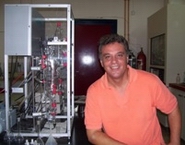| Office:: H.405 (E)
☎ +30 210 772 3971🖷 +30 210 772 3155✉ evoutsas@chemeng.ntua.gr
|
 |
|---|
Recent Research activities:
My research activities fall in the field of Chemical Engineering Thermodynamics and its applications. These can be classified in the following main topics:
Prediction of thermodynamic properties of natural gas mixtures and simulation of natural gas processes- Development of a reliable thermodynamic model able to accurately predict the dew points of natural gas mixtures. To this purpose the so-called UMR-PRU is used, which gives much better dew point predictions than other thermodynamic models commonly employed by the gas industry such as cubic EoS and PC-SAFT.
- Development of thermodynamic models able to accurately predict the PVT behavior of reservoir fluids and natural gas mixtures.
- Development of simple and reliable methods for the characterization of the heavy end (C7+) fraction of the natural gas.
- Phase and chemical equilibrium of mercury in natural gas mixtures.
- Simulation of natural gas processes.
- Use of ILs as alternative solvents for industrial applications
- Use of ILs as alternative solvents in biotechnology
- Synthesis and characterization of recyclable and biodegradable task-specific ILs
- Experimental measurements and modelling of phase equilibrium in mixtures containing ILs.
- Development of models for the prediction of pure compound properties such as boiling poits, critical properties, vapor pressures, liquid densities, heat capacities etc.
- Equations of State (EoS) with emphasis given to the type of mixing rules that combine equations of state with Gibbs free energy models, resulting to the so-called EoS/GE models.
- Modelling of complex mixtures such as those containing hydrogen bonding compounds with the Cubic-Plus Association (CPA) EoS.
- Recovery of high added value bio-active compounds, e.g. essential oils and antioxidants, from natural sources with Supercritical Fluid Extraction (SFE).
- Modelling and optimization of the SFE process.
- Use of supercritical CO2 for fine particle production.
- Modelling of phase equilibria of SCCO2 mixtures.
Biotechnology: prediction of reaction equilibrium constants and conversions in enzyme-catalyzed reactions, prediction of water activities in enzymatic reactions in non-aqueous media (organic solvents, ILs, SCCO2)
Environmental Engineering: prediction of thermodynamic properties of organic pollutants (octanol-water partition coefficients, solubilities in water, Henry's law coefficients, etc.), prediction of the fate of inorganic and organic pollutants in the various environmental compartments (water, aquatic biota, air, soil, sediment).
Energy with emphasis to thermal treatment of wastes with energy recovery: Energy and exergy analysis of the plasma gasification process.


